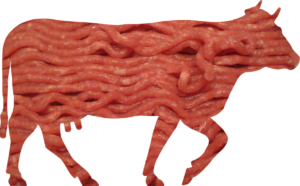
Beef is the culinary name for meat from cattle, particularly skeletal muscle.
Uses
Animal protein is usually of high quality, containing all 8 essential amino acids needed for the growth and maintenance of our bodies.
The buildings blocks of proteins, the amino acids, are very important from a health perspective. Their composition in proteins varies widely, depending on the dietary source.
Meat is one of the most complete dietary sources of protein, the amino acid profile being almost identical to that of our own muscles.
Benefits
The following vitamins and minerals are abundant in beef:
- Vitamin B12: Animal-derived foods, such as meat, are the only dietary sources of vitamin B12, an essential nutrient that is important for blood formation and the function of the brain and nervous system.
- Zinc: Beef is very rich in zinc, a mineral that is important for body growth and maintenance.
- Selenium: Meat is generally a rich source of selenium, an essential trace element that has a variety of functions in the body.
- Iron: Found in high amounts in beef, meat iron is mostly in the heme form, which is absorbed very efficiently.
- Niacin: One of the B-vitamins, also called vitamin B3. Niacin has various important functions in the body. Low niacin intake has been associated with increased risk of heart disease.
- Vitamin B6: A family of B-vitamins, important for blood formation.
- Phosphorus: Widely found in foods, phosphorus intake is generally high in the Western diet. It is essential for body growth and maintenance.
Like plants, animals contain a number of non-essential bioactive substances and antioxidants, which may affect health when consumed in adequate amounts.
- Creatine: Abundant in meat, creatine serves as an energy source for muscles. Creatine supplements are commonly taken by bodybuilders and may be beneficial for muscle growth and maintenance.
- Taurine: Found in fish and meat, taurine is an antioxidant amino acid, which is a common ingredient in energy drinks. It is produced by our own bodies and is important for heart and muscle function.
- Glutathione: An antioxidant found in most whole foods, glutathione is particularly abundant in meat. It is found in higher amounts in grass-fed beef than in grain-fed.
- Conjugated linoleic acid (CLA): A ruminant trans fat that may have various health benefits when consumed as part of a healthy diet.
- Cholesterol: A sterol found in animal fats, and also produced by the human body where it has many functions. Dietary cholesterol has little effect on blood cholesterol and is therefore not considered a health concern
Cautions
- Red Meat May Increase Alzheimer’s Disease RiskScientists believe when proteins called Tau and beta-amyloid accumulate in the brain they either disrupt nerve cells or kill them — and this may be the cause of Alzheimer’s disease. A new study from UCLA, though, suggests that iron accumulation is another possible contributing factor. Using an unusual MRI technique, researchers found that iron had begun to accumulate in the brains of 31 Alzheimer’s patients. Specifically, they discovered this build-up in a part of the brain which is generally damaged in the early stages of the disease. How does this connect to red meat? Well, it’s full of iron, and a high-red meat diet can lead to iron build up.
- Red Meat Can Cause Cardiovascular DiseaseTime and again scientists have demonstrated a connection between eating large amounts of red meat and an individual’s risk for heart disease. Now, a recent study suggests this link between red meat and disease does not derive from the saturated fats and cholesterol, but the fact that your gut microbes break down a compound found in the meat known as carnitine, which in turn produces trimethylamine-N-oxide (TMAO). And TMAO has been associated with atherosclerosis, the fatty build-up in your arteries which in turn may cause a heart attack.
- Your Risk of Colon Cancer Goes Up With Your Red Meat ConsumptionQuite a few studies have provided evidence of red meat potentially causing colon cancer, and a U.S. study which involved 148,610 participants between the ages of 50 and 74 showed that a high consumption of red and processed meats substantially increased the risk of colorectal cancer. Fish and fowl, though, had the opposite effect: long-term consumption of large amounts of these appeared to ward off cancer of the colon and rectum.
- Lots of Beef –> Type 2 DiabetesAccording to recent research, red meat consumption is associated with an increased risk of type 2 diabetes and three extra servings of red meat every week increases the risk of developing diabetes by 50 percent. That’s a pretty disheartening statistic
- Mad Cow Disease. Obviously.Mad cow disease was first discovered in the United Kingdom in 1986 and after that, it blossomed into a full-scale epidemic, affecti g about 180,000 cattle over the next fifteen years. There is mounting evidence that it may cause variant Creutzfeldt-Jakob Disease, which is not only fatal but kills you within fourteen months of diagnosis. So far, only three cases in the U.S. (227 worldwide) have been reported… but that number will eventually rise.
- Meat Just Ain’t What It Used To BeUnlike the steak mom and dad used to cook up on weekends, the meat you eat today has probably been pumped full of hormones to make it grow faster and antibiotics to prevent disease. Although such drugs have all been individually tested and approved by the FDA (Food and Drug Administration), what has never been tested is whether these drugs may be harmful in combination. Meaning, in combination with all other chemicals and drugs you unknowingly absorb, breathe, and drink every day, including those in the air and those in the water. So whether or not an individual chemical, hormone or antibiotic has been proven to have a harmful affect or not, no one really knows what a combination of several chemicals, hormones and antibiotics will do to you.
Interactions
n/a
Other names
- n/a
References
Source: MedicalDaily, http://www.medicaldaily.com/how-red-meat-affects-your-health-7-reasons-avoid-beef-253727
Healthline, http://www.healthline.com/nutrition/foods/beef#section3
Wikipedia, https://en.wikipedia.org/wiki/Beef
